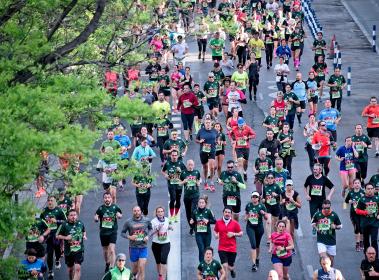The Salvation Army: Clothing drives at Marathon Events
London Marathon Events (LME) partnered with the Salvation Army Trading Company (SATCoL), the trading arm of The Salvation Army, to collect discarded participant clothing at its event in London. On 21st April The Salvation Army collected a record 18.9 tonnes of clothing from the mass participation event.
Salvation Army volunteers and helpers supported to collect clothing discarded by participants prior to the Start line. The clothing was transported to The Salvation Army’s processing centre in the East Midlands for sorting and distribution to be resold, reused or recycled.
The profits that the Salvation Army Trading Company raise, is donated to The Salvation Army to continue to support the work they do across the UK.
The scheme is one of LME’s new sustainability initiatives for 2024 aimed at reducing the environmental impact of its events, with a particular focus on lowering carbon emissions, cutting waste and improving circularity.
The Salvation Army team will continue with the clothing collections at the following events this year:
- Ford RideLondon on Sunday 26 May
- The Big Half on 1 September
- The Vitality London 10,000 on 22 September
- The Royal Parks Half on 13 October
Salvation Army Trading Company Ltd (SATCoL)






